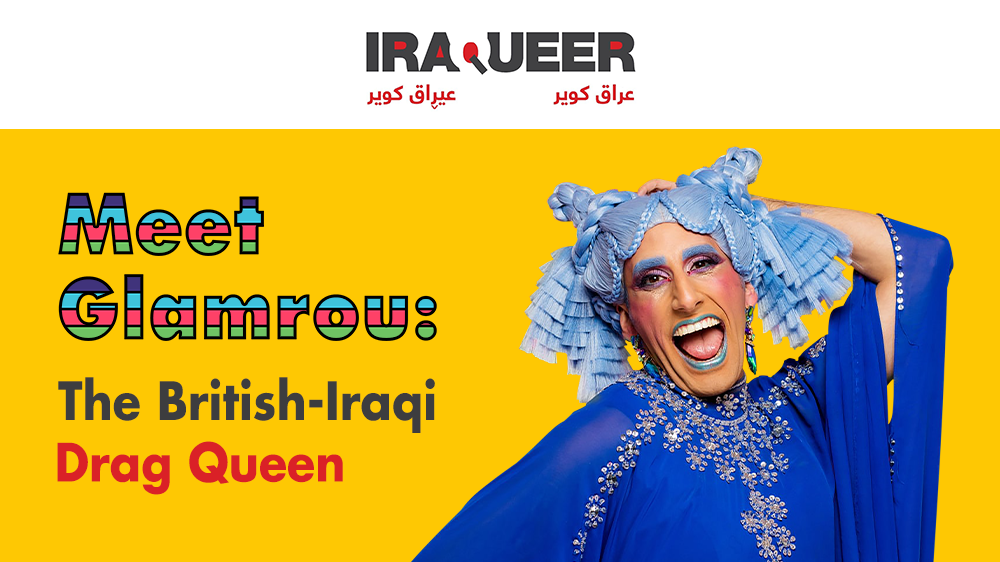|
The 31-year-old non-binary British-Iraqi, Amrou Al-Kadhi tells their story of being a drag queen that originally comes from an Arab and Islamic background. Amrou, who uses Glamrou as their drag name, has been doing drag shows since 2016 and they’re here to talk about their childhood and the obstacles they’ve been through to finally reach a place where they feel happy and empowered.
Amrou says, “During my childhood, I lived between Bahrain and Dubai till I was 11. For the most part, my experience in the Middle East was great – I loved the cultural emphasis on family, and my house was always full with relatives and noise. Always big family lunches and dinners, and the focus on respecting your elders was really important and it was something that made me feel very warm and safe whilst I was growing up. Unfortunately, I don’t see as much of an emphasis on taking care of your family in the UK (especially with the elderly). While living in the Middle East, I did have some negative experiences – particularly when Islam class started warning me about the hellish consequences of homosexuality, which made me very scared about who I was; in Islam, there is a lot of “sin-counting,” and once I started realizing I was different, I developed OCD because I was so worried about the sins I was accumulating. So yes, my mental health deteriorated quite quickly during that time. Living in the Middle East had an impact on my way of thinking about my sexuality. I was obviously very young when I was in the Middle East, but to be honest, there was so little representation or discussion about queer lives, that I didn’t really have the language or conception of it. I think that added to my fear because I wasn’t even sure my experiences were valid or were allowed to exist, and that kind of made me feel invisible. At an early age, Allah was a source of unconditional support and love; I really believed they loved me no matter what, and this was very comforting. When I started to learn about hell, and the terrifying consequences of sin, I became less comforted by Allah, and much more terrified. Allah sort of took the form of a patriarchal dictator rather than a source of maternal comfort. When it comes to the relationship with my family and specifically my mother, I have to say that she is one of the most hilarious people I have ever known. Despite being strict and conservative, she lives for social performance and treats every social occasion like a night at the Met Gala. Before my sexuality became an issue in the family, I would help mama get dressed and we had a kind of secret bond based on a revelry of femininity. In many ways, she was the beginning of my love of drag. So my drag character, Glamrou, is very much an homage to the mother I loved and cherished before things got complicated. She had a pretty horrendous reaction to my sexuality and gender identity during my teenage years, which has left deep emotional scars, and I am still working through those. But I don’t hold a grudge. She is a victim of her own circumstances, and she was doing what she thought she needed to do to protect me from the judgment of the community, even if she went about this in terrible ways. After all I’ve been through, my journey of healing and self-acceptance started in my late 20s. I had been a drag queen for about 6 years at this point, but my drag was very much a façade and a front – like I was telling the world that I was fine and completely proud and in charge of my queer identity, when in fact I still harbored a lot of shame and trauma from my childhood. It was only during a show at the age of 27, when I started using drag to explore my vulnerabilities and my trauma on stage that I was able to process them and heal. In a way, my drag had to become much more honest for this to happen. And I remember that my first drag show was a hot mess. I had no idea what I was doing, and I rented out a crypt at university to do it. I looked terrible and I was petrified. But the second I went on stage, I found a confidence I never knew I had in me. I receive criticism and I get threats from white supremacists who hate the fact that I make fun of British culture in my shows, transphobes continually spew hate at me, and I get threats from conservative Muslims who hate the fact that I sing to Allah during my performances. But mostly, I get love from the people who come to support me, and that’s what I hold on to. The love does drown out the hate. Regardless of all the hatred, I keep doing what I love and for that I wrote my book “Unicorn”. The book is a memoir exploring reconciling being queer and Muslim, particularly trying to make sense of the relationship with my mother. I wrote the book so that other queer Arabs could have somewhere to see themselves and process their own feelings, as well as a way in which to process my own trauma and move beyond it. My message to Iraqi queers who are dealing with hatred is to remember that whatever people will try and make you believe, understand that it’s not your fault. Allah loves you as you are, and your chosen family is out there, waiting for you.” Get to know Glamrou by following them on Instagram and Twitter
0 Comments
Leave a Reply. |

